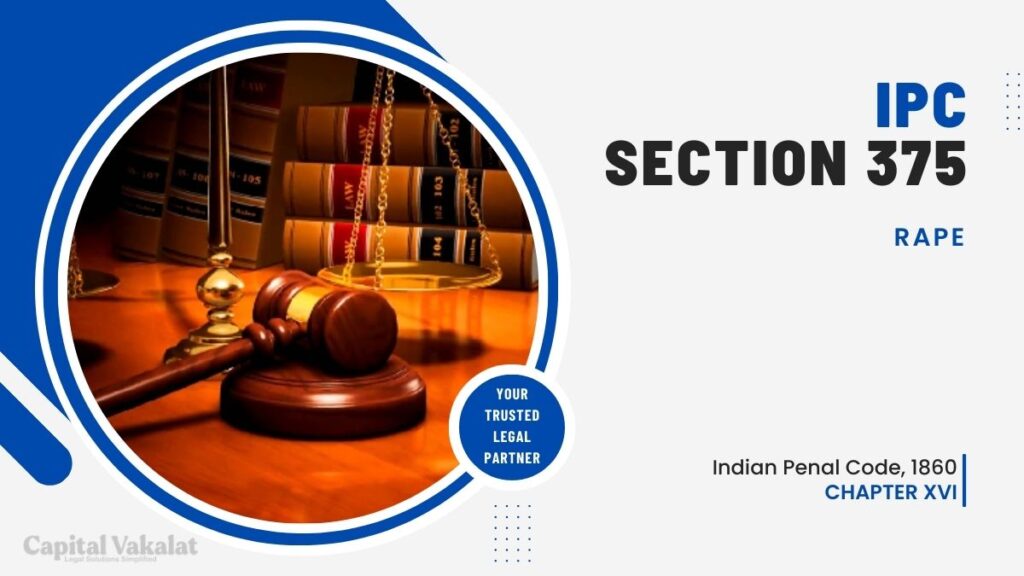In today’s society, discussions around sexual offenses and their legal implications have become increasingly critical. One of the pivotal components in the legal framework addressing rape in India is Section 375 of the Indian Penal Code (IPC). Let’s delve into the intricacies of Section 375, examining its evolution, key elements, challenges, landmark cases, debates, reforms, and the role of public awareness.

Section 375 of the IPC is the statutory provision that defines the offense of rape in India. It plays a crucial role in the justice system by establishing the legal parameters within which cases of sexual assault are adjudicated. Understanding the nuances of this section is essential for comprehending the legal landscape surrounding rape allegations.
Understanding Section 375 IPC
At its core, Section 375 outlines the various acts that constitute rape and establishes the criteria for determining guilt. This section recognizes that sexual offenses can take various forms, categorizing them to ensure a comprehensive approach to justice. By dissecting the provisions of Section 375, we gain insights into the legal intricacies governing sexual offenses in India.
Evolution of Section 375
The legal landscape is not static, and Section 375 has evolved over the years. Understanding the historical context and the amendments that shaped its current form is vital. Landmark cases have played a significant role in influencing legislative changes, marking important milestones in the fight against sexual violence.
Key Elements of Rape Under Section 375
Central to Section 375 is the concept of consent. Examining the role of consent and its nuances in different situations is crucial for a nuanced understanding of rape cases. Additionally, the section addresses age considerations, especially concerning statutory rape, underscoring the importance of protecting vulnerable populations.
Challenges in Implementing Section 375
Despite its significance, Section 375 faces challenges in implementation. Legal complexities and societal attitudes often create hurdles in ensuring justice for victims. Identifying these challenges is the first step towards addressing them comprehensively.
Critiques and Debates
No legal provision is without controversy, and Section 375 is no exception. Debates surrounding the definition of rape, gender neutrality in laws, and related issues form an essential part of the ongoing discourse on sexual offenses in India.
Reforms and Amendments
Acknowledging the need for continuous improvement, the legal system has undergone reforms and amendments concerning sexual offenses. Examining recent changes and the debates surrounding them provides a snapshot of the evolving legal landscape.
The Role of Public Awareness
Legal provisions alone are not sufficient to combat sexual violence. Public awareness plays a crucial role in shaping attitudes towards consent and sexual assault. Education and advocacy are essential tools in fostering a society that rejects all forms of sexual violence.
Conclusion
In conclusion, Section 375 of the IPC stands as a cornerstone in addressing rape cases in India. From its historical evolution to the contemporary challenges and ongoing debates, understanding this legal provision is essential for anyone concerned with the pursuit of justice. As we navigate the complex legal landscape, it is evident that both legal reforms and societal awareness are indispensable in the fight against sexual violence.
Frequently Asked Questions
What role do landmark cases play in shaping the interpretation of Section 375?
Landmark cases set precedents that influence the understanding and application of Section 375 in subsequent judgments.
How has Section 375 evolved over the years?
Section 375 has undergone amendments to adapt to societal changes and address emerging challenges in prosecuting sexual offenses.
Is consent the only determining factor in rape cases under Section 375?
While consent is a crucial element, other factors, such as age considerations, also play a role in determining guilt under Section 375.
What ongoing debates surround Section 375?
Ongoing debates include discussions on the gender neutrality of laws, the definition of rape, and potential areas for further reforms.